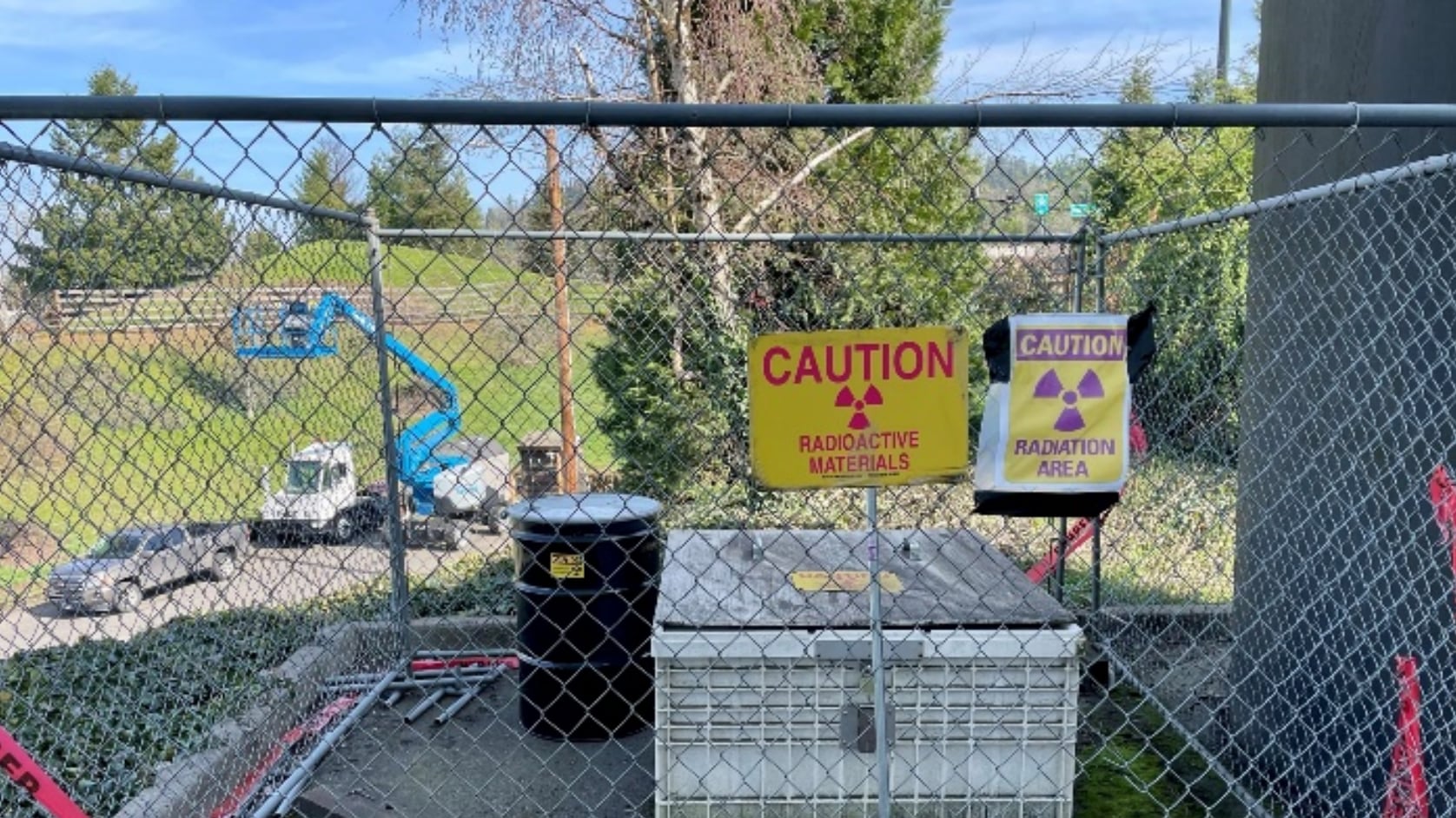Perplexing items occasionally arrive at the dump in Oregon City.
Like, in December 2021: a box of century-old medical supplies full of hazardous radioactive material. Employees packaged it up in lead and stored it in Metro South Transfer Station’s truck wash, which was temporarily shut down to hold it.
Then, three months later, a hand grenade, which forced the transfer station to evacuate employees—to a congregation point near that very truck wash.
Neither the Oregon Health Authority, whose radiation experts Metro consulted in figuring out what to do with the radioactive material, nor Oregon Occupational Safety & Health, which inspected the facility the following year, found that employees’ health was put at risk. There wasn’t enough radium-228 leaking out to cause harm and, according to the department’s deputy director, dump employees followed protocol. But the seemingly haphazard handling of radioactive waste alarmed the auditor for Metro, the regional government that runs the transfer station in Oregon City and Metro Central Transfer Station in Northwest Portland.
Late last month, the auditor released a scathing report revealing the radium, the grenade, a botched plan to buy greener diesel fuel, a lack of safety training, a broken arm, five fires, and lax tracking of where Portland’s hazardous waste really ends up.
Metro is more commonly associated with its parks, convention venues, and the Oregon Zoo, but it also has a much less appealing job: sorting trash. Metro handles about 40% of the region’s garbage, and it’s a hard job. People regularly toss things into the piles at transfer stations that don’t belong there, like old propane tanks and lithium batteries, both of which are flammable. They toss out paint thinner, syringes and fluorescent bulbs chock-full of mercury.
But it’s the agency’s job to deal with the errant hazards and, according to Metro Auditor Brian Evans, it’s failing. The 46-page report, released Sept. 27, highlights risky financial practices and safety concerns at Metro’s two garbage transfer stations, which sort and compact Portlanders’ trash before stuffing it into trucks and transporting it to a dry-side landfill in Arlington, 150 miles east along the Columbia River.
“It’s one of the most eye-opening series of incidents I’ve come across,” Evans tells WW, “and I’ve been the elected auditor for nine years now.”
The Metro Auditor’s Office produces a handful of these reports each year. But Evans decided to put extra time into this one after seeing how grim things were at the transfer stations.
“Every single time we found something that seemed concerning,” he says, “it was more concerning than we originally thought.”
The report faults “a lack of basic management practices and commitment to a long-term vision” and calls for “sustained attention at the highest levels” to fix it.
Metro Council President Lynn Peterson, who is challenging Republican U.S. Rep. Lori Chavez-DeRemer for her congressional seat in 2024, declined to comment on the audit, saying through a spokesperson that she would hold off until after an official briefing on Thursday.
Metro’s official response to the audit offered some solutions. The agency said it hired a “safety specialist” in 2022 and is “in the process of developing a comprehensive safety program for all [Waste Prevention and Environmental Services] facilities.”
In a statement to WW, Metro noted that “risk is inherent in our scope of responsibility in the garbage and recycling system” and trumpeted its “excellent safety record as measured by lack of injuries.” And it offered a mea culpa. “Nonetheless, we agree that more consistent training will benefit our operations and we are taking action,” the statement to WW adds.
Here’s what else the audit found:
Ninety-seven percent of employees didn’t receive annual radiation safety training in 2022. And more than half of employees weren’t trained as required in asbestos awareness or hazard communication. The auditor compiled a list of 27 incidents in 2022 “related to the topics covered in required training,” which included five fires, a broken arm, and the discovery of various explosives. Cary Stacey, deputy director of Waste Prevention and Environmental Services, says the pandemic limited training opportunities, and the department is now catching back up.
Metro paid extra for environmentally friendly diesel fuel it didn’t get. The regional government signed a contract to buy the more expensive fuel, but never inspected the fueling station to ensure it actually got it. After someone raised questions, officials ordered tests in 2019 and discovered their trucks were being filled with the old fuel. Metro overpaid by at least $125,000, the auditor determined. The diesel supplier has since paid it back.
The 40-year-old Metro South Transfer Station has long needed to be replaced. A 2008 master plan found the facility, one of the busiest of its kind in the nation, had reached maximum capacity. Yet little has been done since. As recently as last year, Metro planned to replace the station and build a new one, before slashing the budget by half.
Metro wasn’t verifying where contractors send its hazardous waste. Some contractors haven’t submitted documentation since 2009, the auditor found, and 370 shipping manifests lack “certification of treatment or disposal” since 2016. “Without these documents, WPES cannot provide assurance to the public that their [household hazardous waste] materials were disposed of properly,” the report notes. Metro says this documentation wasn’t required—although, thanks to the auditor, it now is.
The point-of-sale system used by the transfer stations is woefully out of date. A 2019 report found risks associated with the system “unacceptable,” but Metro has yet to replace it, although it’s currently negotiating with a vendor to do so. The 35-year-old system is so fragile that one employee told the auditor they had to get up in the middle of the night to reset it—and another had to come out of retirement to update it after the Metro Council instituted a fee increase.

